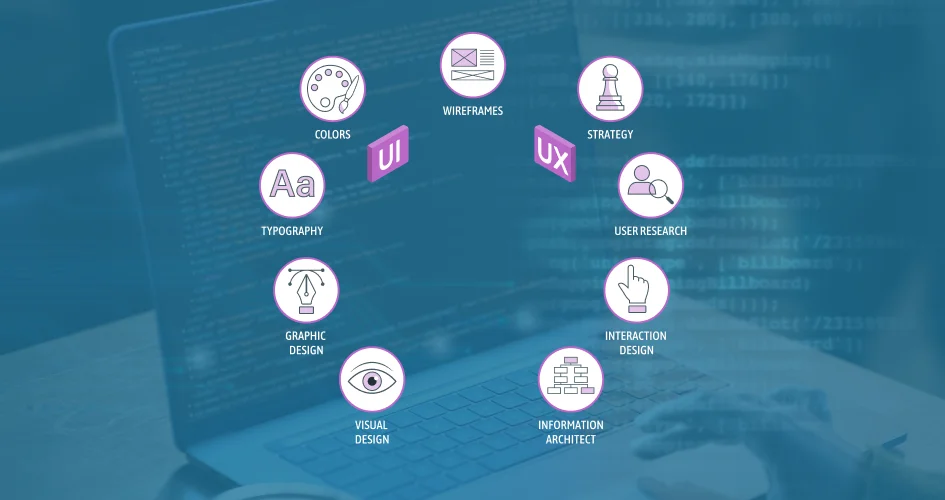Which statement do you believe to be true: ‘AI will take over our tech jobs,’ or ‘the integration of AI in software development will take our tech jobs to the next level‘?
When done right, the answer is the latter.
AI will neither take our jobs nor disturb the development process.
Instead, it’s reshaping the market and your developer team to do more, faster, and wiser.
Let’s dive into its impacts and applications to understand this technology better.
6 Impacts of Artificial Intelligence on Software Development
AI can affect many things in your software development process, excelling in automating routine tasks such as analyzing vast amounts of data, identifying bugs and errors, and improving code quality.
However, it’s important to implement artificial intelligence in software development specifically to reduce the high burnout rate and simplify overall workflows.
Here are six examples of which areas to implement AI’s assistance:
Prototyping
Prototyping is the initial stage of software development, where ideas take shape.
It turns concepts into working models to see if they’re possible and on the right track.
AI can significantly streamline this phase.
AI-driven tools can produce code for various platforms and languages, speeding up prototyping and reducing human errors.
Rapid prototyping tools empower developers to adjust and create software more efficiently and swiftly.
These rapid prototyping tools allow developers to adjust and create their software much faster.
For instance, AI can suggest optimal design patterns or frameworks to use based on the project’s requirements.
This guidance helps in crafting a more secure and efficient prototype from the outset.
Some popular AI tools to help in the process are:
- OpenAI Codex: It’s an AI system that can translate natural language into code, applicable to any programming task.
- Tabnine: This tool has real-time, smart code suggestions and supports over 20 languages.
- CodeT5: It’s an AI model helpful to create code snippets.
Debugging
Debugging refers to discovering and fixing software defects, and it’s traditionally been a significant time sink for developers.
AI integration into software development is revolutionizing this process by handling repetitive and less complex debugging tasks.
AI tools leverage analysis of past bug reports and code alterations to:
- Learn which areas of the code are more prone to problems.
- Monitor them more closely.
- Suggest several potential solutions.
Such automation enables developers to focus on addressing the more intricate and uncommon bugs, which require creative problem-solving skills.
Simplifying and Improving Code
AI tools can simplify and improve code quality by analyzing complex codebases and automating routine code reviews.
This ability makes the code cleaner and more efficient, allowing the codebase more accessible to developers who may be new to the project.
AI is particularly useful in refactoring code, the task of restructuring current code without changing its external behavior as it grows in size and complexity.
Moreover, AI software development tools can assist in ensuring coding standards are met across the board, enforcing a uniform coding style.
This uniformity reduces cognitive load for developers when they switch between different code sections, so they have a smoother development process.
We recommend implementing this ability for legacy systems, where the original developers may no longer be available, and the documentation needs to be improved.
Predictive Analysis
AI helps predict outcomes for current projects with a high degree of accuracy.
These predictions include:
- Estimating the time and resources required.
- Identifying potential roadblocks.
- Calculating the overall feasibility of the project.
Such predictions enable better planning and resource allocation, which is critical for ensuring software applications’ long-term stability and reliability.
AI’s predictive capabilities are not limited to project management of your chosen software development services.
In addition to risk assessment, AI’s predictive analysis can forecast user behavior and preferences, suggesting the development of new features or adjustments to existing ones.
AI can also analyze the impact of new code changes on the overall system, predicting how they might affect performance or interact with existing features.
Testing Automation
Testing is critical to ensure the final product is reliable and meets strict quality standards.
Your team can use AI to automate the execution of tests, which usually take significant manual effort.
AI-driven testing tools work by learning from previous test cases and even predict where future failures might occur with minimal human intervention.
For example, AI in software development can simulate thousands of virtual users interacting with applications to test load capacity and response times.
Ensuring stability under heavy traffic is crucial for applications that handle high loads.
Using machine learning models also brings the ability to perform visual testing, which involves verifying that UI elements appear correctly and functional to the users.
Documentation Generation
Documentation plays a vital role in maintaining and scaling your software, particularly in large-scale projects involving multiple contributors, even more so if your project requires effective collaboration, from onboarding new team members to completing software.
AI in software development streamlines this process by automatically generating documentation from the codebase.
Thus, it saves time and ensures the documentation is up-to-date with the latest code changes.
These tools can analyze the code and extract comments, structure, and usage patterns to create comprehensive, easy-to-understand documentation.
They help any developer quickly understand how to use a piece of code, what it does, and any dependencies it has.
Major Drawbacks of Artificial Intelligence on Software Development
While AI brings numerous enhancements to software development, addressing the challenges coming with its integration remains essential.
Over-reliance
Developers may find themselves in a bind if they rely too heavily on AI in software development for code generation and debugging without fully grasping the logic behind it.
This over-reliance can become problematic when unexpected issues arise that require a deep understanding of the code to resolve, which AI may not be able to solve.
Learning Process
Another concern is the steep learning curve associated with advanced AI tools.
Your developer team needs time and effort to learn how to use these tools effectively.
This significant investment might burden some, especially smaller teams or individual developers.
It can slow down development in the short term, even if it promises increased efficiency in the long run.
Careful Management
AI software development tools can automate routine tasks with minimal human intervention.
However, some AI systems can be complex and require careful management.
They need to be trained with large, high-quality datasets, and their performance must be continuously monitored to ensure they’re functioning as intended.
This complexity adds more responsibility and requires additional skills from the development team.
AI’s Assistance Still Needs Human’s Touch
Despite AI’s impressive capabilities in automating and enhancing various aspects of software development, it can not replace human developers’ nuanced understanding and creative problem-solving.
AI in software development are adept at handling repetitive tasks, analyzing large datasets, and even making predictive suggestions, but they lack the ability to understand context or make ethical decisions.
Human oversight is necessary to:
- Interpret AI’s recommendations
- Make judgments on ambiguous issues
- Provide creative and ethical solutions that AI can’t produce
Developers bring strategic thinking and innovation to the table. They can understand personal user needs, business goals, and design subtleties that AI can’t grasp.
Moreover, while AI can suggest improvements to code, it takes a human to understand the broader impact of these changes on the project and the end-user.
Conclusion
In essence, AI in software development is a tool that expands human developers’ capabilities, not replaces them.
The joint forces between human intelligence and artificial intelligence are where the true strength lies.
It ensures software development is efficient, empathetic, user-focused, and aligned with ethical standards.
Thus, balancing AI software development tools and core programming skills is essential to fully utilize AI’s capabilities without becoming too dependent.
However, there’s no shortcut to the success of your project.
Partner with Intelivita to eliminate the need for micro-managing your team.
Our offshore specialists will efficiently handle it for you.
Together, we’ll shape your ideas into exceptional software that understands the user’s exact needs and is relevant to your business objectives.




